After several hours of battles, sieges, imprisonment and torture in Kingdom Come: Deliverance 2, a groggy Henry of Skalitz is woken by a servant girl in a castle outside Kuttenberg. She greets him like a nobleman. I have Henry push back. He’s a blacksmith’s son. He might have some blue blood care of his biological father, but he grew up in the soot and clamour of the forge. The girl nervously insists, however: Henry must be from the upper crust, or he wouldn’t have been welcomed and feasted by the lord of the estate. He wouldn’t be lying in his very own chamber with its very own hole for shitting in – and in any case, it’s more than her job’s worth to treat him otherwise. In a timid, not quite spiteful show of reverse class policing, she refuses to end the dialogue until she’s dismissed in a manner befitting her station.
It’s a passing exchange that captures KCD2 at its most interesting. The game is classless in the RPG sense, yet classbound as a piece of historical fiction. It’s a fantasy of unbridled agency where you can go anywhere and level yourself up into anything, and a game in which you are continually being asked to know your place – at least, until the bloviating plot decides it for you.

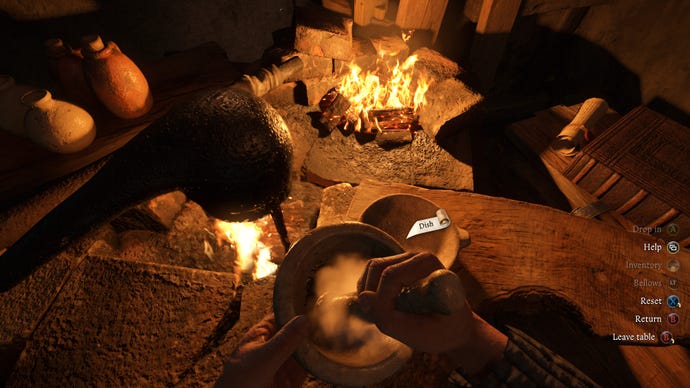
The game inherits much of the morality, reputation and social systems of genre fantasies, like the Elder Scrolls games, but Henry’s undecided class origins characterise KCD2 at every level. Whether you are holding forth at a banquet or interrogating a swineherd in the woods, standing at the head of an army or rotting in a cell, there’s always the opportunity to go up or down a rung on the ladder. It’s all in how and when you speak, how you dress, how you fight, what kind of horse you rode in on, whether you are noticeably injured, how you smell. If you’re armed with a longsword, people might comment that you’re putting on airs and graces; equip yourself with a pike, and you’re positioning yourself as rank-and-file. Dress in silk after a visit to the baths, and you’ll get to hob with the nobs; the serfs, however, may resent you, and you’ll be making yourself a plum target for bandits as you explore the game’s opulently mucky 15th century geography.
The execution of all this can be startlingly subtle for a game that often leans heavily into romance cliches about warring, wenching and wastrelling. I suffered a reputation cut at one point after glamming myself up to escort a courtesan to a wedding because, to be frank, I made her look plain; her flattering response carried a note of derision. The game’s many tradespeople and artisans are especially sensitive to both incompetence and drive-by bullshit artistry, which can be a problem when you’re haggling over the price of a cape. Fail a conversational skill check and they’ll think you’re a poser; ask an unnecessary question and they’ll think you’re a fool.
While it takes a while to layer up negativity to the point that it seriously inconveniences you, there’s a wonderful prickliness to Deliverance 2’s reputation system, which shapes reactions within individual settlements and communities. As with Telltale’s open-ended “X will remember that” notifications, the HUD’s bluntness (smiley faces when you’ve impressed somebody, frowny faces when you haven’t) proves a strength. Rather than abstracting the process, it leaves you to figure out what, exactly, has earned somebody’s respect or disgust by digging into the detail of the ample writing and characterful – if often hammy – voice performances.
At the heart of KCD2’s class angst is Henry’s brotherly yet awkward relationship with Sir Hans Capon, who is both his partying buddy and class superior. As in the previous Kingdom Come, Hans is a spoilt young fop who pines to be taken seriously, yet is incapable of acting the part. He needs you to step in when he talks or drinks or shags himself into difficulties, but if you do that you’re also overstepping your bounds as manservant. Hans will forgive such impertinence up to a point that is never clearly indicated, and that ambiguity keeps their conversations engrossing – more engrossing than they should be, given that Hans himself is pretty boring. You need to know when to speak as protagonist, and when to play the NPC whose dialogue is all function and obsequy.
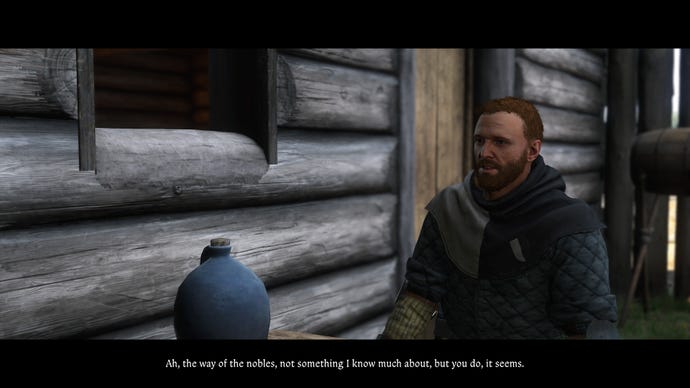
These questions of class sharpen when they form part of a quest intrigue. At one point, you and Hans visit a distant stronghold so that Hans can deliver a request for troops. While Hans haggles with the local lord, the latter’s lieutenant takes you aside and, over cups and dice, smilingly presses you about Hans’s agenda, because after all, us commoners have to stick together. I had Henry go along with this up to a point. Then, I smilingly turned the tables on the other guy: gosh, don’t your chief have a lot of horses! More horses than men, from the looks of things. Where did he come by them? I greatly enjoyed the delicate line the game challenged me to walk here between my conflicting allegiances.
In general, Deliverance 2’s quests are all about navigating the competing perspectives of nicely fleshed-out individuals. They are there to express the game’s society, rather than send you out into the boondocks to pluck herbs or harvest respawning lowlives (though such quest-givers do exist, populating otherwise handy roadside campsites). Most involve trips back and forth between communities, each of which has ideas about the other, and often grant insights you can apply elsewhere. They pull you back through the workings of the setting like a shuttle through a loom, adding to the systemic ambience cultivated by NPCs with day-night routines, myriad trades such as tanning and smithing, and bits of virtuoso set dressing such as maids carrying laundry to the pond. Rather than fraying under your agency, this medieval tapestry is richer for your participation.
Your forays are checked by the game’s touches of survival simulation – fatigue, hunger, equipment wear-and-tear. I don’t think the survivally bits are a total success. The deterioration of clothing and armour feels very videogamey, with shoes evaporating in a matter of days, though the in-world presentation of dents on helmets and faded sleeves is convincing. The game’s representation of saving the game once again walks the line between whimsy and frustration: you’ll need to find, buy or brew Saviour’s Schnapps to save without quitting. Drinking schnapps also gets you drunk, so you won’t want to knock back a flask every 10 minutes, and it’s easy to forget that saving is an in-game item when the game checkpoints itself anyway after more significant quests.
Combine that idiosyncracy with some review build crash bugs and – as in my case – it might cost you a couple hours of progress. Still, practicalities like these impose broad rhythms that, again, add to the feeling of participation. They hamper you just enough to kindle everyday pleasures like the relief of finding a safe place to sleep after a hard day’s travel, without weighing on your mind from moment to moment.
Together with the absence of more generic plundering quests, the pressure to keep yourself clothed, fed and well-equipped also helps you understand the value others place on money and property. A new sword in Skyrim is a non-event: throw it on the pile, delete when you become unable to sprint. A new sword in KCD2 is a big deal, at least to begin with. While there’s the option to amass a fortune through thievery, it’s relatively difficult in KCD2 to just moider the mooks and/or take their stuff. Even the no-name bad ‘uns come from somewhere, and if you slaughter or abuse them, the world will react, directly or indirectly. Filch somebody’s belongings and, assuming you get away with selling or wearing stolen goods in the face of inspections and so on, the locals will become mistrustful. The guard presence will thicken.
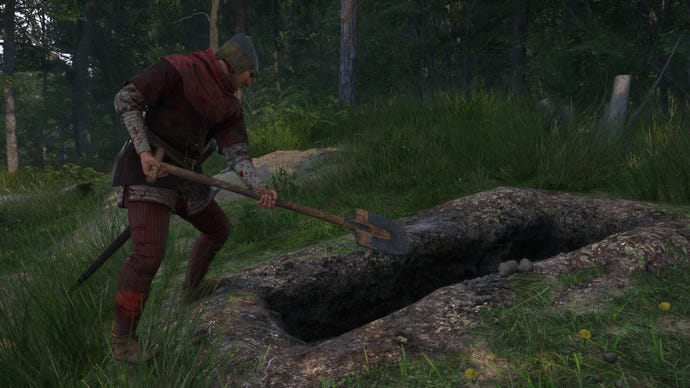
KCD2’s combat also has its simulation elements, offering a spread of ostentatiously authenticky weapon, armour, and attack types, together with a limb damage system and various buffs and debuffs. You can feel and hear the complexities: it’s all in the clatter of a sword from plate armour, versus the reassuring crunch of a mace. But at heart, it’s an approachable question of blocking and countering when you see the associated icons, mixed up with a generous pinch of good luck and knowing when to flee. It feels pleasantly raw and breathless: foes react in stagy but entertaining ways, yelling things like “fuck, I’m [/lookup debuff table]” when they’re hurting. There are passive perks, combos and souped-up “master strikes” to reward technical players, but these are flourishes: the key thing is managing your stamina, being mindful of your blind spots, and not overcommitting.
I am not a technically minded player. My Henry fares best in a pitched battle that gives him the luxury of circling behind people fighting other people. He isn’t some bastion of chivalry, just a guy trying to survive in a world of braying, duplicitous aristocrats. Or at least, that’s how I’ve tried to play him. KCD2’s great weakness is simply that the core hero story and RPG progression curve slowly take priority over the game’s more flexible, ambiguous conception of a bastard making sense of a society that can’t quite make sense of him. After a few main quests – say, 30 hours of play – your Henry should be relatively established with several sets of clothes for combat, daily wear and socialising, some decent weapons and plenty of cash, crafting materials and trinkets. From that point on, there’s less need to negotiate with the world to make headway.
The game’s unobtrusive, and perhaps overly generous approach to character progression also gradually smears away any RPG playstyle you might cleave to at first. Your stats improve passively when you perform a relevant action: overload yourself (an inevitability, because this is an RPG) and your strength stat will go up; talk to people and you’ll get better at talking to people; spend a lot of time in the woods and you’ll get better at poaching. Combine this with major quests that daisy-chain together a bunch of activities – sneak in here, talk to that guy, make some horseshoes, brew a potion, etcetera – and you’ll grow steadily more capable across the board.
All of which slightly sabotages one of KCD2’s other strengths: it makes failure worthwhile. The biggest compliment I can pay the writers and designers is that I hardly ever save-scummed to obtain a rosier outcome. While a few failures trigger a “game over”, many produce scenarios as winding and gratifying as any victory, and in any case, living life in Henry’s shoes has taught me to take the rain with the shine. In particular, I never wanted to simply overpower people the way blockbuster games teach you to, and Deliverance 2 met me halfway, initially, by having characters dunk on me when I tried to act the tough guy, or applaud me for being a good sport when I got my arse kicked. But after a series of mandatory plot skirmishes, my Henry has become a proficient and well-appointed combatant, because that is what KCD2 fundamentally requires him to be. It’s as though the game had assumed the role of that servant girl from my intro: it won’t let me get on with my day unless I consent to my own greatness.
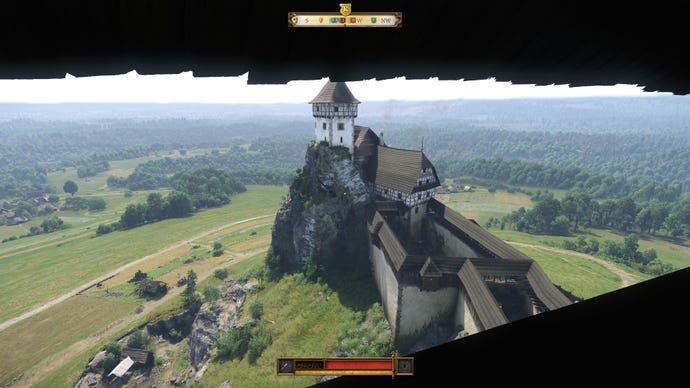
The more capable Henry is, the more tedious his yarn becomes. At heart, it’s a simple journey to avenge the murder of his father – a motivation that unfolds in familiar ways, with familiar morales and punchlines of the hate-leads-to-suffering and we’re-not-so-different variety. It goes hand in hand with loads of setpiece battles and dynastic jostling, which is bingeable enough until you realise that you can’t picture what the key personalities do when they aren’t yelling variations of “FRESH HORSES!” This is a plot-first, character-second affair. There are some brilliant individual chapters: a quest to prevent an execution by finding your way to a dying person at the top of a well-defended tower, for example, where you use everything you’ve learned to bypass dozens of NPCs. Sometimes, the game also shakes things up with a double-cross that performs a Metroid reset, restoring Henry’s need to haggle with the detail of the world. But a lot of the time, the plot just feels like pageantry.
Inevitably, there is an enormous blank at the centre of my analysis of Deliverance 2 – I know absolutely eff-all about 15th century Bohemia. As such, I also can’t really comment on what this fable says about the present-day Czech Republic – whether it serves a purpose akin to, say, The Crown in British TV. But I can say that KCD2 is a more sensitive, curious and irresolute portrayal than you might guess from either the previous game or from the self-defeating gator-baiting of Warhorse’s co-founder Daniel Vavra. Its society is diverse: during his adventures, Henry gets to pick the brains of a Jewish merchant, speak to a Black noble from Mali, and run errands for a community of Roma travellers. The game portrays bigotry and gives you the opportunity to question it or go along with it. The writing also appears to respond to some of the criticisms levelled at the original Deliverance: there’s an early quest devoted to humanising, if not necessarily redeeming, the Cumans who were once depicted as faceless outsiders.
Still, it’s not above a bit of elementary Othering. There’s a tour-guide feel to how ready people from different cultures are to unpack their traditions for Henry – a willingness to be added to the codex that is perhaps less a feature of Kingdom Come and more the expectation of encyclopaedic transparency attendant on open world RPGs. And yes, it’s still pretty boorish in its portrayal of women. KCD2 has a lot of female characters, many of whom are substantial in terms of both quantity of dialogue and (sub)plot agency, but as a chivalric fable dominated by scenes of macho posturing and bromance, it can only permit itself so much interest in what women do when they’re not being gazed at or mistreated by men. The female cast consists heavily of nags, healers, comely maids, femme fatales, damsels and harlots. If these portrayals draw upon accounts of women’s lives during the period, they are also living stereotypes couched in modern-day English. It feels like the writers have both the will and the chops to get beyond them – my introductory anecdote about the servant girl is one example – but doing that also goes against the spirit of the game.
I don’t think Kingdom Come will ever not be a boy’s day out, not while Henry is involved. But after 50 hours, I do feel like it could develop further as a study of feudal class mobility. Confronted with abundance, I’d have liked Henry to get a little spoilt. Or at least, develop preferences or foibles that inconvenience me as the pressures of subsistence fall away. I’m always making him eat cooked cabbage because cabbage is convenient, but perhaps he really hates the stuff. Perhaps it gives him gas. Perhaps hanging around Hans for too long has robbed him of his tolerance for the bare necessities. Likewise, I’m always making him wear yellow hose because I think it brings out his complexion, but perhaps he thinks it makes him look like a giant ornamental banana.
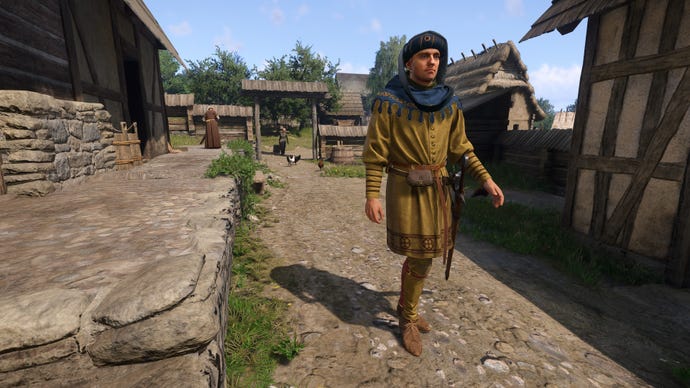
I can’t comment in any depth on Deliverance 2’s portrayal of Bohemia, but I can conclude by talking a little about what the game shares with other historical fantasies. In particular, it frequently reminded me of Hilary Mantel’s Wolf Hall novels, a sympathetic, mythologising account of the rise and fall of the English minister Thomas Cromwell. Like Warhorse’s Henry, Mantel’s Cromwell is a blacksmith’s boy, though not a noble’s bastard. Like Henry, he must dance around the whims of people of higher birth. Like Henry, his value ultimately is that he is man for all seasons, able to turn his hand to anything after a lifetime spent dragging himself from the gutter by any means necessary: soldier, bureaucrat, labourer, merchant, scholar, scribe, marriage-maker, weaver, butcher.
The difference is that when Mantel’s story begins, Cromwell has already levelled up all the associated skilltrees and entered the postgame. Far from being a charming show of tenacity and pluck – the kind of thing that gets you called a “good man” by your betters – his supreme competence makes him both awe-inspiring and sinister, while setting the scene for his undoing. There is, in fact, a closer parallel to Cromwell in Kingdom Come: Deliverance 2, an older man with a gift for the gab who you’ll fleetingly control while pursuing the main quest. Perhaps that’s who Henry needs to become in Kingdom Come: Deliverance 3.











Add comment